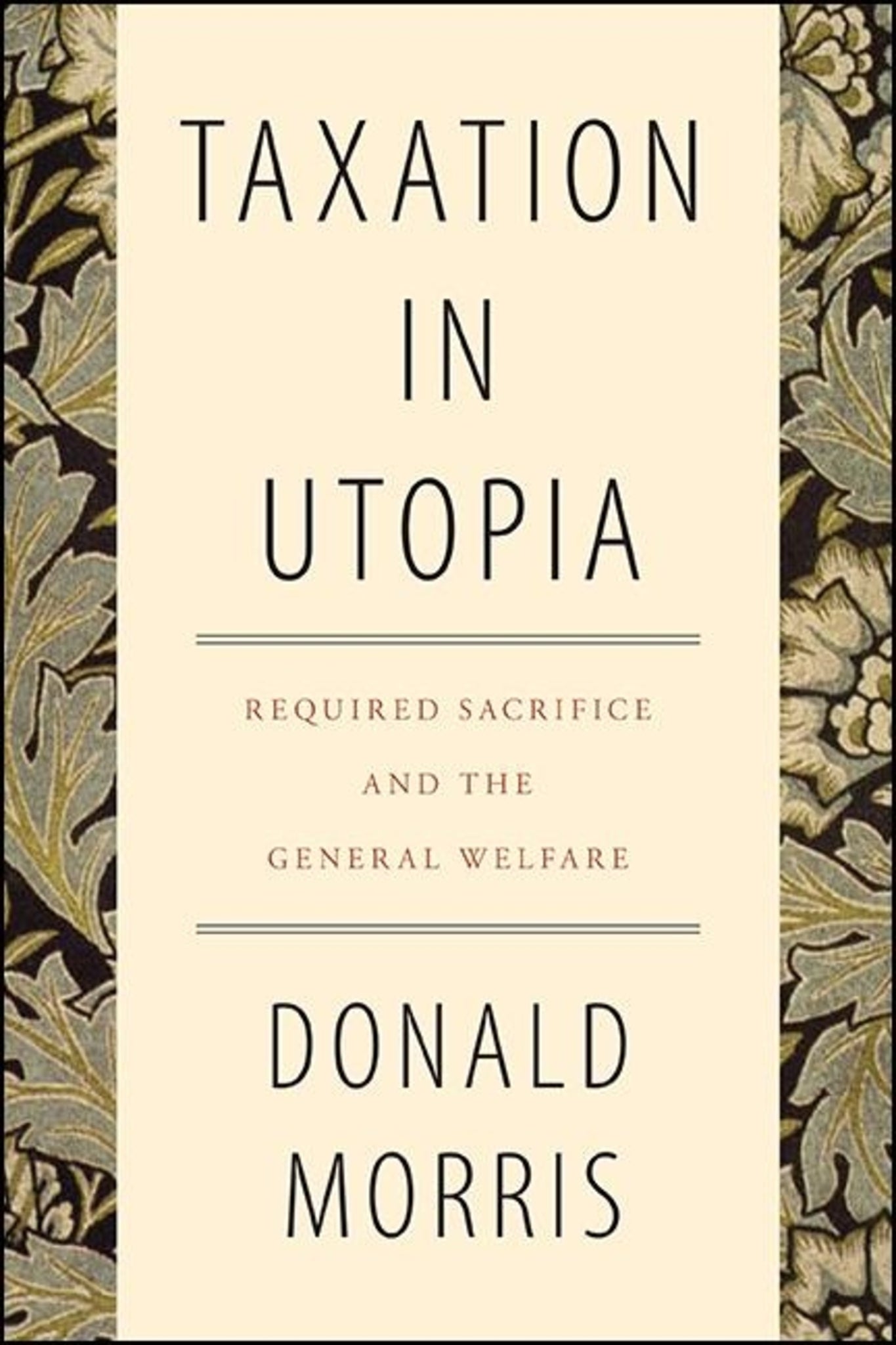We're sorry. An error has occurred
Please cancel or retry.
Taxation in Utopia

Some error occured while loading the Quick View. Please close the Quick View and try reloading the page.
Couldn't load pickup availability
- Format:
-
02 July 2021

An interdisciplinary exploration of utopian political philosophy from the neglected perspective of taxation.
Taxation in Utopia explores utopian political philosophy from the neglected perspective of taxation. At its core, taxation is an ethical question. It requires people to sacrifice for the benefit of others, whether or not they also benefit themselves. Donald Morris refers to this broader, nonmonetary context as constructive taxation, which includes restrictions on privacy and access to information, constraints on marriage and child-rearing, and conventions restricting the proprietorship of land. Morris examines this in the context of various utopian writings, such as More's Utopia, as well as literary treatments of these issues, such as Bellamy's Looking Backward. This interdisciplinary exploration of utopian taxation provides a novel approach to examining relations between a state's view of the general welfare and the sacrifices this view requires of its citizens.


"This is an extremely well researched and thorough exploration of utopian literature, effectively back to the beginning of the written word. Morris covers every major work of literature with a utopian element, and works through the tax (both pecuniary and constructive) present in all of these works. His explanation and analysis of economics and doctrine of tax laws is of the highest order." — Jennifer Bird-Pollan, University of Kentucky J. David Rosenberg College of Law
Acknowledgments
Introduction
Chapter One: Taxation as a Moral Quest
Part One: Taxation: The Tail Wags the Dog
An Experiment in Shared Sacrifice
Ends and Means
Practicality
Taxation as a Moral Question of Sacrifice
Part Two: The Construal of Taxation and of Utopia
The Sinews of Taxation
Beyond Revenue: Defining a Tax
Defining Utopia
Chapter Two: Privacy Deprivation as Taxation
The Nature and Role of Privacy
Thomas More (1478–1535): No Spots for Secret Meetings
Big Brother's Eyes in Nineteen Eighty-Four
H. G. Wells (1866–1946): Indexing Humanity
Zamyatin (1884–1937): Who Are "They" and Who Are "We"?
Expectations of Privacy
Chapter Three: Taxing Access to Truth
Part One: Plato and Bacon
Opaque Government
Plato (c. 428–c. 348 BCE): The Republic of Lies
Francis Bacon (1561–1626): The Sacrifice to Science
Part Two: Orwell and Godwin
Totalitarian Methodologies: Orwell (1903–1950)
William Godwin (1756–1836): Anarchist Tax Policy
Chapter Four: Taxation by Required Work or Occupation
Part One: Plato and More
Work and Inequality
Matching Specialized Abilities to Society's Needs
Plato (c. 428–c. 348 BCE): The Ideal Job in the Republic
Thomas More (1478–1535): The Common Obligation of Common Daily Toil
Part Two: Bellamy, Gilman, Wells, and Skinner
Edward Bellamy (1850–1898): The Industrial Army
Charlotte Perkins Gilman (1860–1935): Half the Human Race Is Denied Free Productive Expression
H. G. Wells (1866–1946): Labor Laws and the Insult of Charity
B. F. Skinner (1904–1990): We Have Created Leisure Without Slavery
Part Three: Saint-Simon and Campanella
Henri Saint-Simon (1760–1825): The Human Spirit Follows a Predetermined Course
Tommaso Campanella (1568–1639): Assigned Labor in The City of the Sun
Chapter Five: Taxing the Family: Marriage, Childrearing, and Eugenics
Part One: Plato, More, Bacon, Wells, and Le Guin
Marriage Restrictions
Francis Bacon (1561–1626): Marriage Except for the Wise
H. G. Wells (1866–1946): Motherhood as a Service to the State
Le Guin (1929–2018): Anarchism and the Tax-Free Family in The Dispossessed
Part Two: Owen and Gilman
Robert Owen (1771–1858): The Tax on Childrearing
Charlotte Perkins Gilman (1860–1935): Motherhood and Eugenics in Herland
Part Three: Skinner, Eugenic Tax Procedures
B. F. Skinner (1904–1990): Eliminating the Meaner Emotions in Walden Two
Eugenic Tax Procedures: Campanella, Bellamy, Zamyatin, Huxley
Chapter Six: Taxation and Land Proprietorship
Part One: Harrington, Godwin, and Owen
The Land Question
James Harrington (1611–1677): Inheritance Tax in Oceana
William Godwin (1756–1836): Anarchy and Private Property
Robert Owen (1771–1858): Peaceful Revolution
Part Two: George, Tolstoy, Wells, and Nozick
Henry George (1839–1897): Progress, Land, and Poverty
Tolstoy (1828–1910): A Landowner's Struggle with the Land Problem
Wells (1866–1946): The Land Question in A Modern Utopia
Robert Nozick (1938–2002): Entitlement Theory
Chapter Seven: Taxation Purged from Utopia
Part One: Ayn Rand (1905–1982): Atlas Shrugged
Disparate Social Systems
Rand's Four Utopias
Rand's "Tax" System
Part Two: Robert Nozick (1938–2002): Utopia of Utopias
The Most Extensive State that Can Be Justified
The Developing State: The First Four Stages
The Fifth Stage
Taxes, Forced Labor, and the Minimal State
Utopia: The Minimal State Framework
Taxation in Nozick's Utopia of Utopias
In Closing
Bibliography
Index



